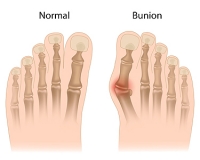Bunions are bony growths that appear along the outside of the foot at the base of the big toe joint. They are thought to occur in response to excess pressure and friction on the toes from wearing ill-fitting shoes, as well as due to a genetic predisposition for bunions. This common toe deformity can be painful, as the bunions rub against shoes and cause the big toe to move out of alignment and towards the smaller toes. There are a variety of treatment methods available for bunions. Conservative methods can be prescribed to manage the symptoms of a bunion. These may include wearing wider, more supportive shoes, wearing orthotics such as toe stretchers, splints, or bunion pads, taking over-the-counter medications to reduce pain, and applying ice to the bunion to decrease inflammation. Bunions can be removed permanently through surgery. If you have painful bunions, talk to your podiatrist about potential treatment options today.
If you are suffering from bunions, contact Dr. Kenneth Donovan of Advanced Care Foot and Ankle. Our doctor can provide the care you need to keep you pain-free and on your feet.
What Is a Bunion?
A bunion is formed of swollen tissue or an enlargement of boney growth, usually located at the base joint of the toe that connects to the foot. The swelling occurs due to the bones in the big toe shifting inward, which impacts the other toes of the foot. This causes the area around the base of the big toe to become inflamed and painful.
Why Do Bunions Form?
Genetics – Susceptibility to bunions are often hereditary
Stress on the feet – Poorly fitted and uncomfortable footwear that places stress on feet, such as heels, can worsen existing bunions
How Are Bunions Diagnosed?
Doctors often perform two tests – blood tests and x-rays – when trying to diagnose bunions, especially in the early stages of development. Blood tests help determine if the foot pain is being caused by something else, such as arthritis, while x-rays provide a clear picture of your bone structure to your doctor.
How Are Bunions Treated?
- Refrain from wearing heels or similar shoes that cause discomfort
- Select wider shoes that can provide more comfort and reduce pain
- Anti-inflammatory and pain management drugs
- Orthotics or foot inserts
- Surgery
If you have any questions, please feel free to contact one of our offices located in Warren, Livingston, and Toms River, NJ . We offer the newest diagnostic and treatment technologies for all your foot care needs.

